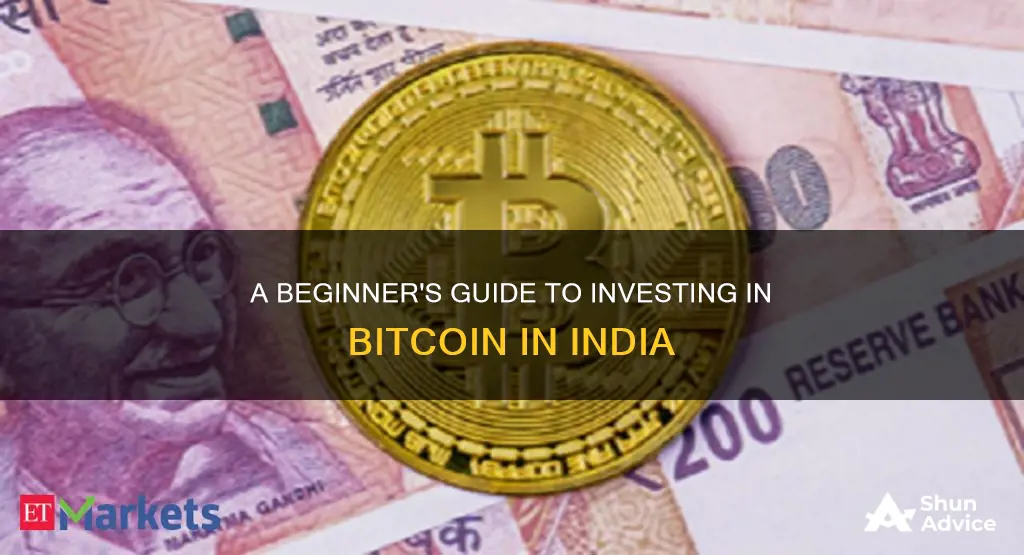
Bitcoin is a decentralised digital currency that has been on a stellar run since 2021, with a current trading price of $57,020 and a market capitalisation of $1.1 trillion. While it is not considered legal tender in many countries, including India, investors are keen on adding it to their portfolios. In this article, we will discuss how to invest in Bitcoin in India, the legal status of Bitcoin in the country, and the risks associated with it.
| Characteristics | Values |
|---|---|
| What is Bitcoin? | Bitcoin is a cryptocurrency or digital currency that can be used as a mode of exchange and a store of value. It is decentralised and cannot be controlled or altered by any individual or organisation. |
| Why Invest in Bitcoin? | Cryptocurrencies are one of the fastest-growing asset classes, and Bitcoin holds around 69% of its market share. The price of Bitcoin is highly volatile, which serves as an advantage to risk-friendly investors and traders looking to make quick and high returns from their investment. |
| How to Invest in Bitcoin? | Through a Crypto Exchange, P2P Transaction, or Bitcoin Mining. |
| Crypto Exchange Platforms in India | CoinDCX, CoinSwitch, Mudrex, WazirX, ZebPay, Unocoin, Coindesk, Coinbase |
| Minimum Investment | There is no minimum investment amount to buy Bitcoin in India. However, exchanges may have different minimum requirements, typically between ₹100 - ₹500. |
| Payment Options | Bank transfers, net banking, Mobikwik, cryptocurrency wallet, UPI, RTGS, NEFT, debit or credit cards, and other digital payment methods. |
| Storage Options | Cold Wallets (offline) and Hot Wallets (online). |
What You'll Learn

Bitcoin's legal status in India
Bitcoins Legal Status in India
Bitcoin is one of the most sought-after cryptocurrencies globally, and its popularity is growing in India. However, the country is still developing its regulatory framework for cryptocurrencies, so investors should educate themselves on this asset class before investing.
Bitcoin and other cryptocurrencies are not illegal in India, but they lack clear regulatory guidelines. The Indian government is working on a framework to address associated risks and concerns.
The Reserve Bank of India (RBI), the Ministry of Finance, and the Securities and Exchange Board of India (SEBI) are the key cryptocurrency regulators in the country. While the RBI Governor and spokespeople have made statements that could lead one to conclude that cryptocurrency is illegal, there is no specific ban on it in India.
Taxation
The Indian government has not passed any official clarification on whether Bitcoin is legal. However, in the Union Budget 2022, the government imposed a 30% tax on income from the transfer of virtual digital assets or cryptocurrencies and a 1% TDS on transactions exceeding 50,000 INR annually. This "tax first, regulate later" approach adds a layer of complexity to the regulatory environment.
Investing in Bitcoin
To buy Bitcoin in India, an individual must place an order on a cryptocurrency exchange. They can then transfer the payable amount from their bank account to the crypto exchange or use alternative payment methods such as RTGS, NEFT, debit or credit cards, and other digital payment options.
Storage
After purchasing Bitcoin, investors need to securely store their assets in a cryptocurrency wallet, which can be provided by the crypto exchange. There are two types of wallets: cold wallets, which store private keys offline, and hot wallets, which work with internet connectivity and allow for basic transactions.
Key Considerations
- The absence of clear regulations means that trading in cryptocurrencies is done at the investor's risk.
- The market is notoriously volatile, and there is always a risk of losing capital.
- It is essential to do comprehensive research and track the movement of prices and Bitcoin's market share.
- Seek professional financial advice before engaging in any crypto-related activities.
Coinbase: A Smart Investment Move or Miss?
You may want to see also

How to buy Bitcoin in India legally
Step 1: Register and Verify Your Account on a Crypto Exchange
Choose a reputable cryptocurrency exchange that operates in India, such as ZebPay, Coinbase, or Mudrex. Create an account by providing your personal details and complete the Know Your Customer (KYC) verification process to comply with regulatory requirements. This step is crucial for ensuring the security of your transactions and investments.
Step 2: Add Funds to Your Wallet
Before buying Bitcoin, deposit funds into your exchange wallet. Most crypto exchanges support payment methods such as NEFT, IMPS, and net banking. Some platforms, like Mudrex, also allow you to use UPI, a rarity in the industry.
Step 3: Place Your Bitcoin Order
Once your wallet is funded, you're ready to buy Bitcoin. Go to the Bitcoin page on your chosen platform, click 'Buy', and choose from a lump sum or recurring investment. Then, simply pay the amount.
Step 4: Select a Secure Storage Option
After purchasing Bitcoin, consider transferring it from the custodial wallet provided by the exchange to a non-custodial wallet for enhanced security. Non-custodial wallets grant you full control over your funds and carry a minimal risk of being hacked since no personal information is stored. They are available in both hardware and software options.
Points to Remember:
- Research the global and Indian crypto capital markets and track the movement of digital coin prices and Bitcoin's market share.
- While Bitcoin offers the potential for high returns, it is a new and highly volatile instrument in the Indian market. The RBI has not made it legal tender, so there is a risk of losing your capital.
- Understand the regulatory environment and tax implications of investing in Bitcoin in India. Owning and trading Bitcoin is legal, but there is a 30% tax on crypto transaction capital gains and a 1% Tax Deducted at Source (TDS).
- Only invest what you can afford to lose, and consider a long-term investment approach.
Alternative Methods to Buy Bitcoin:
- Coin Sets: Curated crypto baskets exclusive to certain platforms, like Mudrex, that are formed as index funds or based on popular crypto themes.
- Exchange-Traded Funds (ETFs): Bitcoin spot ETFs allow you to gain exposure to Bitcoin without directly investing in it. They track Bitcoin's performance, so your investment moves up and down with the market.
- Peer-to-peer (P2P) exchanges: Decentralized exchanges like Uniswap and PancakeSwap allow you to buy Bitcoin directly from another holder without an intermediary. Some centralised exchanges, like Binance and Bybit, also have P2P platforms.
Selling Bitcoin:
When you're ready to sell, you can do so on the same cryptocurrency exchange you used to buy. The exchange will convert your Bitcoin (BTC) to INR, which you can then transfer to your bank account.
Storing Bitcoin:
While crypto exchanges offer built-in wallets, consider transferring your Bitcoin to a private wallet for added security. Research different types of private wallets, such as cold and hot wallets, to find one that suits your needs and risk tolerance.
Safety and Security Tips:
- Use strong passwords
- Enable two-factor authentication
- Be wary of phishing scams
- Never share your secret recovery phrase or private key with anyone
Bitcoin Investment: Safe or Risky Bet?
You may want to see also

How to store Bitcoin
Storing Bitcoin safely is essential to prevent loss or theft. Here is a comprehensive guide on how to store Bitcoin securely:
Types of Wallets
There are two primary types of wallets: cold wallets and hot wallets. Cold wallets are offline wallets that store your private keys offline, providing a higher level of security. Hot wallets, on the other hand, are online wallets that allow users to send and receive tokens over the internet.
Cold Wallets
Cold wallets are considered one of the safest methods for storing Bitcoin. They can be further categorised into two types:
- Commercial Non-Custodial Cold Wallets: These are typically USB-type drives, such as the Ledger Nano X or Trezor Model T, that connect to your device. They store your private keys and come with software that works in parallel to your wallet. While these wallets are generally safe, it is important to disable any wireless options after use to minimise vulnerabilities.
- Alternative Non-Custodial Cold Wallets: This includes methods such as using a USB drive, writing your keys down on paper, or printing them as QR codes. While these methods are safe from hackers, there is a risk of loss or theft.
Hot Wallets
Hot wallets are software that stores your private keys and connects to the internet. They are more vulnerable to hacking but are convenient for transactions. There are several types of hot wallets:
- Desktop Wallets: These are programs that reside on your computer. They are not the safest option as they are susceptible to hacking.
- Mobile Wallets: These are programs hosted on mobile devices, such as smartphones. While they are convenient for transactions, they are not very secure.
- Web-based Wallets: These wallets are hosted by a web service, meaning you are allowing a third party to store your keys. This option is not secure as it increases the risk of hacking.
Best Practices for Storing Bitcoin
When deciding how to store your Bitcoin, consider the amount you have invested and your level of technical expertise. For large sums, prioritise security by using cold storage methods like hardware wallets. For small amounts, a hot wallet on a mobile device or exchange platform may be more convenient for transactions.
Additionally, here are some general guidelines to enhance the security of your Bitcoin:
- Back up your wallet regularly: Ensure you back up your entire Bitcoin wallet, including all wallet.dat files, to multiple secure locations, such as USB drives, CDs, or other removable devices.
- Use strong passwords and encryption: Protect your backups with strong passwords and encryption to prevent unauthorised access.
- Keep your software up to date: Update your wallet software, operating systems, and other applications to patch security vulnerabilities and enhance the safety of your Bitcoin.
- Use a multi-signature wallet: This requires multiple people to approve transactions, reducing the risk of theft.
- Generate and secure your seed phrase: A seed phrase is a series of randomly generated words that act as a master password for your wallet. Memorise it, write it down, or use a titanium stamping kit to preserve it. Ensure you keep it in a safe place, separate from your home or safe deposit box.
In summary, storing Bitcoin securely involves understanding the different types of wallets and their vulnerabilities. By combining safe storage practices with regular backups and security measures, you can effectively minimise the risk of losing your Bitcoin.
Why You Shouldn't Delay Investing in Bitcoin
You may want to see also

The minimum amount of investment in Bitcoins
There is no minimum investment amount required to buy Bitcoin in India. An investor can purchase small units if they do not wish to buy an entire cryptocurrency. In India, an investor can buy Bitcoin in Indian Rupees with a minimum capital of Rs.100. This limit could vary between various crypto exchanges. For example, CoinSwitch allows investments to start from as low as INR 100 in Bitcoin.
When registered, individuals can add money to their wallets and use this sum to order Bitcoins. The amount of money added to the wallet can then be used to place an order for Bitcoin.
It is important to note that while there is no minimum investment amount, the price of Bitcoin is high. As of August 7, 2024, Bitcoin is trading at $57,020. This means that if Bitcoin's price was $38,000, an investment of $1,000 would result in an individual owning 0.026% of a Bitcoin.
Investing in Bitcoin: How Much Money Do You Need?
You may want to see also

Bitcoin's performance and risks
Bitcoin's performance has been impressive since its launch in 2009. From October 2013 to early June 2021, its value increased by almost 30,000%. In March 2024, it reached a record high of $73,750. However, it is a very volatile investment. For instance, after hitting a high of almost $20,000 in 2017, its value plummeted and rose to no more than half of that until 2020. Its price is influenced by factors such as demand, supply, and even an ill-timed tweet from Elon Musk.
Bitcoin undergoes a "halving" every few years, where supply is reduced, which, coupled with demand, may drive the price higher. The demand for Bitcoin has soared in the past few years, with new buyers, including institutional investors, fuelling a Bitcoin rally.
The rise of crypto exchanges in India, such as WazirX, has made it easier for Indians to invest in Bitcoin. These exchanges offer low or zero fees, intuitive user interfaces, and minimal maintenance charges. However, investing in Bitcoin and other cryptocurrencies comes with multiple risks.
One of the biggest risks is the possibility of losing access to one's Bitcoin due to lost or forgotten passwords or digital keys. Another risk is the high transaction costs associated with Bitcoin. Each sale can result in a capital gain or loss, and transactions can take several minutes to complete.
The future of Bitcoin is also uncertain. It is possible that no one will be talking about Bitcoin in five or ten years. Central banks may establish their own digital currencies, which could replace Bitcoin and other cryptocurrencies. Additionally, the environmental impact of mining and the potential to destabilize local currencies have led to aggressive actions by some governments, such as China, to shut down mining and transactions.
Despite the risks, Bitcoin has become a popular investment option in India and appears to be going mainstream. However, experts recommend that investors should not allocate a large percentage of their investment portfolio to Bitcoin due to its volatile nature.
Strategies for Investing in Multicoin Capital
You may want to see also
Frequently asked questions
Yes, it is legal to buy Bitcoin in India. However, in 2018, the Reserve Bank of India (RBI) restricted commercial banks from facilitating Bitcoin transactions in the country. This order was overturned by the apex court in 2020.
There is no minimum amount required to invest in Bitcoins in India. You can buy a small fraction of a Bitcoin, starting with as little as 100 INR.
You can buy Bitcoins through online cryptocurrency exchanges or via peer-to-peer transactions. Popular exchanges in India include CoinDCX, CoinSwitch, Mudrex, and WazirX.
You can store your Bitcoins in a blockchain wallet, either a "cold wallet" (offline) or a "hot wallet" (online). Cold wallets are generally considered more secure.
Bitcoin is a highly volatile investment, and its value can fluctuate drastically. Additionally, it is not legal tender in India, and there is always a risk of losing your capital.







